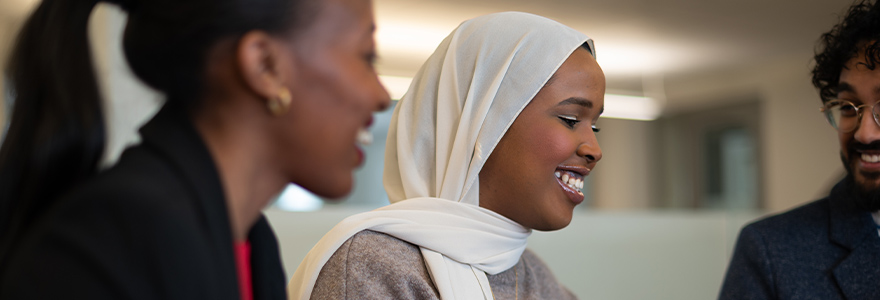Fardowsa Halane, Class of 2023
Fardowsa Abdullah Halane: Personal experiences fuel the drive for change

Fardowsa Abdullah Halane (centre) with fellow Master of Public Health students.
By Cam Buchan
Fardowsa Abdullah Halane is a passionate advocate for public health; a passion that developed early in life and was inspired by family.
Born in Somalia and raised in Canada, Halane’s personal experiences have fueled her drive to make a difference.
Now part of the Master of Public Health Program at Schulich School of Medicine & Dentistry, Halane's academic journey began in high school when she developed a keen interest in understanding how public health systems work and how they can be improved for marginalized individuals.
“As someone from an immigrant family, I developed a genuine interest in understanding how public health works and its impact on society,” said Halane, who came to Canada with her mother and siblings. “I want to improve lives, especially those from marginalized communities.”
This interest led her to pursue a degree in kinesiology at Western, where she focused on reducing the risk of diabetes, a prevalent issue in both her home country of Somalia and Canada.
“And from there on, I wanted to go into public health so I could continue this journey,” she said.
During her second year, Halane was voted president of the Somali Student Association and initiated a program, called Access to Health Care for All, with her fellow students aimed at teaching physical activities to children in the London area. The goal was to reduce the risk of diabetes. Unfortunately, the program faced setbacks due to the onset of the COVID-19 pandemic; and many participants from marginalized communities lacked access to the necessary technology to continue participation online.
But Halane is determined to restart Access to Health Care for All once she is finished with her Master’s program.
When asked about her choice to pursue public health, Halane emphasizes the importance of addressing the social determinants of health.
“In my role as a research assistant in the emergency division at London Health Sciences Centre, I have learned the significance of social determinants of health. I have come to realize that public health encompasses more than just medical interventions; it also includes elements like income, housing, and other factors that have a significant impact on a person's well-being,” she said. “By addressing these determinants, I hope to improve people's lives and create a healthier society.”
Halane is thrilled to have a practicum job with the Canadian Coalition for Seniors Mental Health (CCSMH), an opportunity that connects well with her interests.
“I have always been interested in the relationship between aging and wellness,” she said. “When I learned about an opportunity to work with CCSMH, I realized it was the ideal match for what I liked to do. I particularly connect with the organization's emphasis on the mental health of elders. I really believe that mental health is equally as significant as physical health, and this is especially true for seniors, who frequently deal with particular difficulties and stressors.”
Looking ahead, Halane aspires to make a difference through policy work. Recognizing the potential impact of legislation and policy changes, she intends to leverage her knowledge and expertise to advocate for improvements in housing, physical activity, and other social determinants of health. By integrating a cultural approach to public health, she aims to create sustainable and culturally sensitive programs that will have a lasting impact on communities.
Halane attributes much of her growth and inspiration to the Public Health program. The program's approach, which combines professor-led lectures with student experiences and case-based learning, has shaped her understanding of public health as a holistic discipline.
Now as Halane embarks on her career in public health, her definition of success lies in the sustainability and community acceptance of the programs she develops.
“The combination of the professor’s point of view and the student point of view has really shaped how I think about the future,” she said. “It has helped me think how to create change in a culturally-relevant, culturally-sensitive way.”








